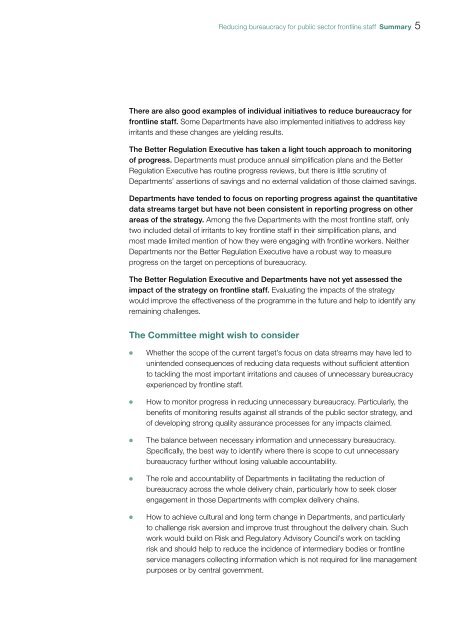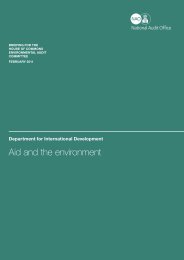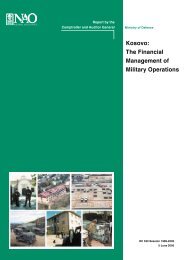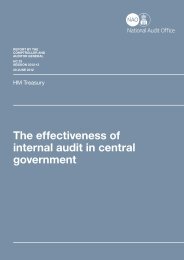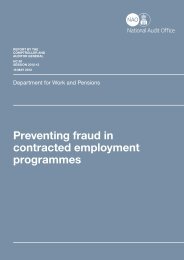Reducing bureaucracy for public sector frontline staff: Briefing for the ...
Reducing bureaucracy for public sector frontline staff: Briefing for the ...
Reducing bureaucracy for public sector frontline staff: Briefing for the ...
Create successful ePaper yourself
Turn your PDF publications into a flip-book with our unique Google optimized e-Paper software.
<strong>Reducing</strong> <strong>bureaucracy</strong> <strong>for</strong> <strong>public</strong> <strong>sector</strong> <strong>frontline</strong> <strong>staff</strong> Summary 5<br />
There are also good examples of individual initiatives to reduce <strong>bureaucracy</strong> <strong>for</strong><br />
<strong>frontline</strong> <strong>staff</strong>. Some Departments have also implemented initiatives to address key<br />
irritants and <strong>the</strong>se changes are yielding results.<br />
The Better Regulation Executive has taken a light touch approach to monitoring<br />
of progress. Departments must produce annual simplification plans and <strong>the</strong> Better<br />
Regulation Executive has routine progress reviews, but <strong>the</strong>re is little scrutiny of<br />
Departments’ assertions of savings and no external validation of those claimed savings.<br />
Departments have tended to focus on reporting progress against <strong>the</strong> quantitative<br />
data streams target but have not been consistent in reporting progress on o<strong>the</strong>r<br />
areas of <strong>the</strong> strategy. Among <strong>the</strong> five Departments with <strong>the</strong> most <strong>frontline</strong> <strong>staff</strong>, only<br />
two included detail of irritants to key <strong>frontline</strong> <strong>staff</strong> in <strong>the</strong>ir simplification plans, and<br />
most made limited mention of how <strong>the</strong>y were engaging with <strong>frontline</strong> workers. Nei<strong>the</strong>r<br />
Departments nor <strong>the</strong> Better Regulation Executive have a robust way to measure<br />
progress on <strong>the</strong> target on perceptions of <strong>bureaucracy</strong>.<br />
The Better Regulation Executive and Departments have not yet assessed <strong>the</strong><br />
impact of <strong>the</strong> strategy on <strong>frontline</strong> <strong>staff</strong>. Evaluating <strong>the</strong> impacts of <strong>the</strong> strategy<br />
would improve <strong>the</strong> effectiveness of <strong>the</strong> programme in <strong>the</strong> future and help to identify any<br />
remaining challenges.<br />
The Committee might wish to consider<br />
¬¬<br />
¬¬<br />
¬¬<br />
¬¬<br />
¬¬<br />
Whe<strong>the</strong>r <strong>the</strong> scope of <strong>the</strong> current target’s focus on data streams may have led to<br />
unintended consequences of reducing data requests without sufficient attention<br />
to tackling <strong>the</strong> most important irritations and causes of unnecessary <strong>bureaucracy</strong><br />
experienced by <strong>frontline</strong> <strong>staff</strong>.<br />
How to monitor progress in reducing unnecessary <strong>bureaucracy</strong>. Particularly, <strong>the</strong><br />
benefits of monitoring results against all strands of <strong>the</strong> <strong>public</strong> <strong>sector</strong> strategy, and<br />
of developing strong quality assurance processes <strong>for</strong> any impacts claimed.<br />
The balance between necessary in<strong>for</strong>mation and unnecessary <strong>bureaucracy</strong>.<br />
Specifically, <strong>the</strong> best way to identify where <strong>the</strong>re is scope to cut unnecessary<br />
<strong>bureaucracy</strong> fur<strong>the</strong>r without losing valuable accountability.<br />
The role and accountability of Departments in facilitating <strong>the</strong> reduction of<br />
<strong>bureaucracy</strong> across <strong>the</strong> whole delivery chain, particularly how to seek closer<br />
engagement in those Departments with complex delivery chains.<br />
How to achieve cultural and long term change in Departments, and particularly<br />
to challenge risk aversion and improve trust throughout <strong>the</strong> delivery chain. Such<br />
work would build on Risk and Regulatory Advisory Council’s work on tackling<br />
risk and should help to reduce <strong>the</strong> incidence of intermediary bodies or <strong>frontline</strong><br />
service managers collecting in<strong>for</strong>mation which is not required <strong>for</strong> line management<br />
purposes or by central government.


